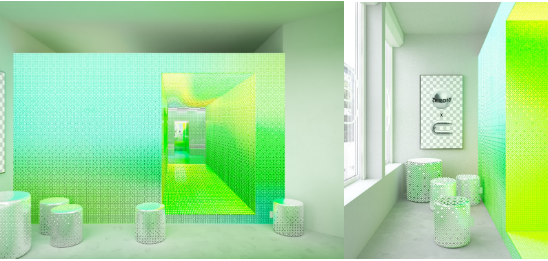AR fashion platform ZERO10 is teaming with creative studio Crosby Studios to host an AR-integrated retail pop-up in New York City’s SoHo from September 7-18.
ZERO10’s proprietary AR clothing technology will allow customers to try-on five digital-only pieces at the concept space designed by Crosby Studios, making it one of the first companies to do so in a retail location. A limited number of daily visitors that can sign up on the event’s website, which is being promoted on ZERO10’s social channels.
SoHo has become the go-to location for retail concepts integrating AR try-on or NFTs. In June, Salvatore Ferragamo opened a store featuring a temporary NFT and hologram integration. “When thinking of how to approach the design of the interior, it was crucial for us to create a flexible look and feel — something more akin to an art gallery or an exhibition center,” said Daniella Vitale, chief brand officer of the Ferragamo, told Glossy at the time. She explained that the design would allow the store to evolve over time.
As for the ZERO10 concept store, Crosby Studios designed it to be an interactive space, in line with the pixelated aesthetic that defines Crosby Studios. At Paris Fashion Week Fall 2022, the company teamed with jewelry brand Repossi to create pixelated furniture for a web3 café. This ZERO10 partnership marked the first time that Crosby Studios worked with digital clothes.
The focus of the ZERO10 store is AR try-on in fitting rooms, content creation through AR and socialization at the bubble tea Eat Me Milk Me bar, located in the store. Three of the digital items from the collection will be free for customers to try on and save via imagery and video, while two digital items will be available for sale, one priced at 0.1 eth as an NFT and the other at $5.
Fitting rooms will be equipped with QR codes that give access to the AR try-on items, either in real-time or through a photo upload. For customers without an iPhone, there is an in-unit iPhone provided. The items feature disappearing prints and gradients, making for more interactive garments.
“It was important for me to reconceptualize the concept of fashion with this limited collection. I aimed to do that by reinventing the entire retail experience, from store environment and design to the very clothes guests are able to shop,” said Crosby Studios founder Harry Nuriev.
ZERO10 CEO George Yashin said that more retailers will soon adapt to the new reality where such store elements are the norm. “[The] AR clothing try-on experience integrated into physical retail is a new language that brands will speak with the new generation of consumers,” he said. “This generation has different values, habits and new consumption behavior. Some may resist this technological progress, but we believe that companies that don’t implement AR experience in retail within the next five years will be left behind.”
Augmented reality try-on from ZERO10 has already been used online by up-and-coming designers, including Tommy Cash, Maisie Wilen and Edward Crutchley. Shopify research shows that the use of AR can cut returns by 40% and boost conversion by 97%.
“With a curated experience, where you go to a store and you know everything is set up to maximize the experience, either with AR or with pre-loaded VR glasses, you get a more refined exposure to retail that you may not have if it’s just brick-and-mortar or online,” said Stefan Hauswiesner, CEO of smart retail tech company Reactive Reality. “The shopping experience is about more than just physical access to the product. An AR-powered branded store experience can bring other value to the client; in the future, 99% of the business will be the experience, and access to the product will just be a side effect.”
Yashin said there is also a time savings benefit for brands wanting to familiarize customers with their products. “A brand’s customer could be dressed in an item within one second, without the customer even entering or being in a physical store, through AR clothing try-on technology,” he said. “We’ve been working on the development of new products for physical retail, including the ZERO10 AR pop-up store. These solutions could also be integrated outside of brand stores, helping to reduce the cost of servicing retail outlets.”




